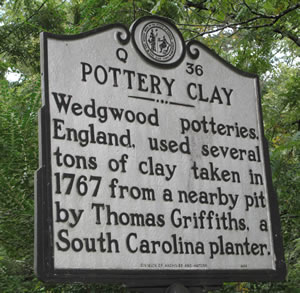Pottery Traditions:
Wedgwood Clay Historical Marker, Franklin

Pottery Clay historical marker, Franklin
Kaolin is a white-burning clay, often called “china clay” in reference to the discovery of Chinese porcelains. After Marco Polo returned from a trip to the East with a porcelain pot in hand, European aristocracy began amassing collections of the mysterious material. Pound-for-pound, porcelain was as precious as gold. In 1767, famed English potter, Josiah Wedgwood obtained a sample from Macon County, close to the Cherokee town of Cowee. Known to its Cherokee owners as “
unaker” for its white color, Wedgwood recognized the fine-grained clay as kaolin. Eventually, five tons were shipped to England, but he was not able to develop an effective export system to move large quantities overseas. Wedgwood’s efforts at mining clay in western North Carolina were documented in an 18th century journal that gives today’s historians a glimpse into kaolin production. Today, both the
Wedgwood pottery site and the historic
Cherokee town of Cowee are marked with highway historical markers.
“Pottery Clay” and “Cowee” Highway Markers, Highway 28 North, Franklin
http://www.ncmarkers.com/




